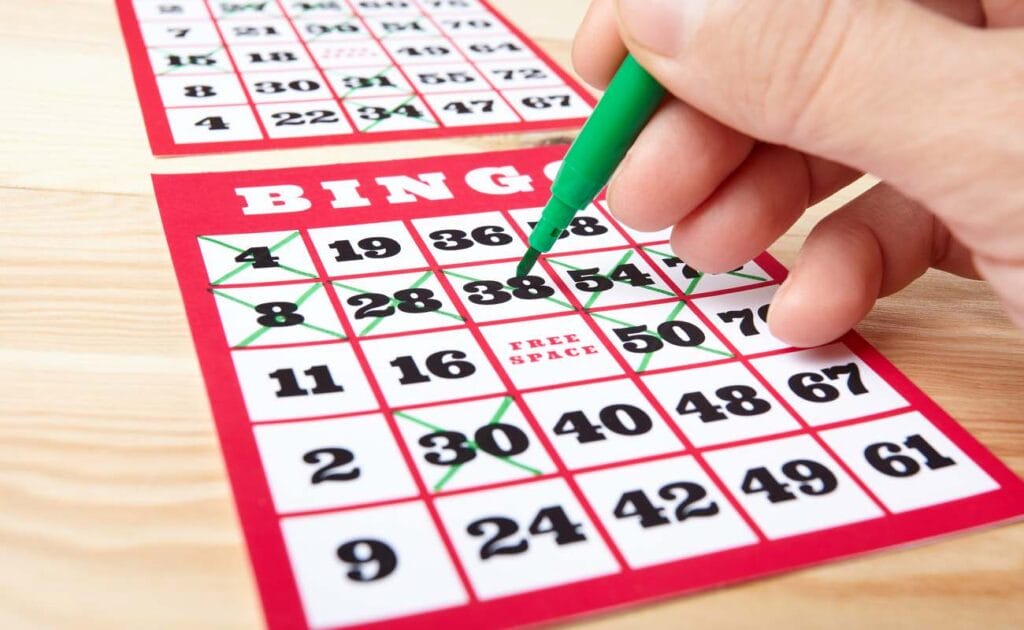
Bingo has existed, in one form or another, for centuries. Today, it’s enjoyed by many people around the world as one of the most popular online casino games as well as at brick-and-mortar establishments. But where did this classic game come from, and has it always been as popular as it is today? Join us as we answer these questions and discover the history of the numbers game.
Who invented bingo?
Nobody knows exactly who is responsible for the creation of this historic game, but the earliest records point to “Il Gioco del Lotto d’Italia,” a lottery game played by Italians around 1530.
The original experience spreads across Europe
The game eventually found its way out of Italy and into other parts of the world. It’s believed to have been played in France in the late 1770s, where it was known as “Le Lotto.” It was particularly popular among the French aristocracy. It’s possible that the Germans also took to the game, not as a gambling pursuit but rather as an education tool, in the 1800s. The British also played the game in the late 1800s, although it went under different names, including tombola, house or housey-housey.
The modern game
The game that we all know and love today can primarily be credited to an American named Edwin S Lowe, a toy salesman who spotted it being played at a carnival in 1929. It went by the name of “beano,” back then and caught his attention. Lowe noted how the game played out and decided to put together his own version.
He reportedly tested out his game among his friends, who absolutely loved it. During their playtests, one of them got so excited when they won that they cried out “bingo!” instead of “beano.” Understanding how catchy it was, he decided to call his game by this accidental phrase – and the rest is history.
Lowe’s game exploded in popularity, but he came across another problem due to the incredible number of people who wanted to play bingo: his cards were too similar. As more people purchased and played his game, he began to receive more complaints about how multiple individuals could win during a game. This made it incredibly difficult for game organizers, who either had to split prizes or plan ahead with multiple rewards.
He reached out to Carl Leffler, a math professor from Columbia University, to help him create more unique cards. Thanks to Leffler, Lowe was able to add 6,000 unique cards to his game and reduce the chances of multiple people winning a game. However, the amount of work required to design these cards by hand may have been too much for Leffler, who reportedly had a mental breakdown, poor chap.
Lowe would eventually go on to sell his company and retire as a multimillionaire.
On its way out?
Over the decades, bingo continued to grow in popularity in the US and in the UK, with dedicated halls for games springing up everywhere – some of which remain open today. However, around the 1980s and into the 1990s, its popularity began to stagnate and decline. This may have been for many reasons, including the fact that the game had remained pretty much the same as when it exploded into the mainstream in the mid-20th century, and that it faced stiff competition from other forms of entertainment.
There was another issue that arose in the mid-2000s that also impacted the popularity of bingo halls. A public smoking ban came into effect in the US, which dampened hall attendance. The UK also banned smoking in public in 2007, with similar consequences. On both sides of the Pond, many halls had to close as a result of the smoking ban.
But even though brick-and-mortar venues were undoubtedly struggling in the early 2010s, giving the impression that the game was dying, there was another place where it was quietly surging in popularity – cyberspace!
Online bingo reaches new fans

With the internet becoming accessible in the early 1990s, it was only a matter of time before someone saw the potential of this global network of computers for games, but more specifically, for online bingo games.
As expected, entrepreneurs spotted this opportunity, and lo and behold, the first dedicated site was launched in 1996. This USA online bingo site was called “Bingo Zone” and offered free-to-play games. This meant players didn’t need to wager to play, although they also didn’t win any prizes as a result. Despite the absence of rewards, this site was revolutionary since it allowed people to play online bingo together without needing to set foot outside of their homes. And it laid the foundation for all the other sites to follow.
Over the years, more sites offering the online version of the game would launch, either as a dedicated service or as part of an online casino. These bingo sites gradually added more features, such as online chat, automatic daubing and plenty of new twists on the game. They also offered several betting options, with the cheapest games costing as little as a few cents to play. Of course, with this came the chance to win real prizes!
These games also became increasingly accessible as mobile technology evolved. In the past, you needed a fairly powerful desktop computer to play most online casino games, but this changed as computer hardware became more powerful and also much smaller. Laptops were the first “mobile” devices that one could use to play online bingo, but in 2007, the way most people would interact with mobile technology would change forever.
Dawn of mobile gaming
In that year, Apple released its first iPhone – and in doing so, introduced the smartphone concept to the masses. Not only did these phones have large, spacious screens (at least compared to other mobile phones at the time,) but they were also powerful enough to run online games. This opened the game to an entirely new audience who may not have been interested in going to a hall to play or found it inconvenient or limiting to play it on their desktop computer.
Move forward roughly a decade, and the demographics of online bingo began to change. While the game was still mostly played by women, research started to suggest the average player’s age had decreased. A study by a UK-based research organization called YouGov showed that the largest group of online players in the UK was between the ages of 25 and 34 – a major shift away from the stereotype of the game mainly being enjoyed by seniors!
What lies ahead for the game?

If we look at where the game is today, there’s undoubtedly room for it to continue to evolve (just as it did with the hybrid game genre Slingo, a combination of bingo and online slots,) and for it to find even more players. But will those players be found in the halls of old or playing in the virtual rooms in cyberspace? It seems more likely to be the latter, but there’s no reason why it shouldn’t be both.
Since the pandemic began, the game has gained even more popularity, with enthusiasts and new recruits playing games on the street while social distancing, as well as online and via communication platforms such Zoom. We’ve even heard of friends playing bingo while watching movies together over streaming platforms and live chats – and noting down phrases and lines instead of numbers.
Who knows how fans will reinvent the game in the future. But we’ll be keeping an eye on developments because they’re sure to be vibrant, creative and full of fun!
Play the best online bingo games at Borgata Bingo
At Borgata Bingo, New Jersey residents can try their luck on a range of exciting games, including the classic 75-ball and 90-ball bingo games, as well as jackpot slots, Slingo, and many more exciting titles. See what incredible gameplay is on offer when you play online bingo. Download the app via iOS or Android or register online to join the party at Borgata Bingo.
